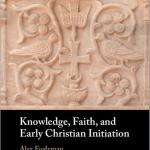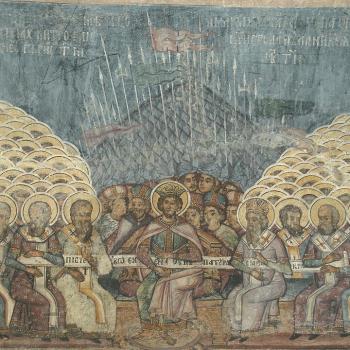Just as a reminder, if you couldn’t tell from all of my posts last year, Jesus’ favorite topic and the recurring theme of mine is greed. Happy New Year!
There are a few texts in the Scriptures that many American Christians very rarely hear preached because no one really wants to think about them. One of those texts is Jesus’ conversation with the rich young ruler. Though the story appears in each Gospel, I’m going to take a close look at the account in Luke 18:18-30. You’ll soon see why.
After Luke gives an account of children being brought to Jesus, he tells us that someone asked Jesus what he needed to do to inherit eternal life. Matthew tells us the man is young, Mark just tells us that he’s a man, but Luke tells us that he is a “ruler”, some kind of official. They all agree that he is rich. Unlike some of the questions Jesus received from religious leaders, this question appeared completely genuine and Jesus treated it as such. The Son of God affirmed the man, outlining the commandments that He knew he knew. The ruler then replied, “I have kept all these things since my youth.” Then Jesus hit the young man where it hurt with words that the Church has been running from since the first century: “There is still one thing lacking. Sell everything, as much as you have, and distribute to the poor, and you will have treasure in heaven; then come, follow me.”
In the early third century, Clement of Alexandria, one of the first well-known Christian theologians, offered an interpretation of this text that we are more comfortable with today. We read the text and Jesus seems to be clearly telling this rich young ruler to sell all of his stuff and, understanding that Christ’s words are not limited to this man, we ask ourselves: “Is He talking to me?” Clement said in essence: “Yes, but He didn’t actually mean for the young ruler to sell all of his stuff. That would be ridiculous!” Hear it from Clement himself:
“Sell all that you possess”: what does this mean? It does not mean, as some superficially suppose, that he should throw away all that he owns and abandon his property. Rather he is to banish those attitudes toward wealth that permeate his whole life, his desires, interests and anxiety. These things become the thorns choking the seed of a true life. It is not a great thing or desirable to be without any wealth, unless it is because we are seeking eternal life. If it were, those who possess nothing – the destitute, the beggars seeking food, and the poor living in the streets – would become the blessed and loved of God, even though they did not know God or God’s righteousness.
One can hear the echoes of popular antiracist thought in Clement’s rationalization: racism is about attitudes rather than material redistribution. What matters is how I feel about a particular racialized group and my repentance revolves around whether my attitudes have changed. I have really repented, I am told, when my friendships and social networks have changed to involve more people who are different from me. But as we have iterated over and over, love is not love if it is not material. What Clement does in his interpretation of Christ’s command is strip it of its materiality in order to “make it make sense”. And Clement is not alone. Future Christian thinkers as they reflect on this text would make similar conclusions. Augustine, in reflecting on this text in his letter to Hilarius (Letter 157), reflects on this same passage, suggesting a distinction between “the counsel of perfection” and the command to regular believers: the counsel of perfection is to give up your possessions while the command to regular believers is just not to be overly attached to them. The same spiritualizing move is made and it is one that we are most comfortable with because it doesn’t necessarily require sacrifice; merely openness to sacrifice if the Lord asks us of it.
Unfortunately, Jesus, especially in the Gospel of Luke, does not allow us that wiggle room. It is also in the Gospel of Luke where Jesus, after expounding on why the Christian ought not worry about money or their needs (in itself an amazing passage), he tells this same crowd of disciples,
Do not be afraid, little flock, for your Father has been pleased to give you the kingdom. Sell your possessions and give to the poor. Provide purses for yourselves that will not wear out, a treasure in heaven that will never fail, where no thief comes near and no moth destroys. (Luke 12:32-33)
The command to sell one’s possessions to give to the poor is not limited to the rich young ruler. In fact, the only distinction in Christ’s words is that the rich young ruler is explicitly told to sell everything. For the rich young ruler, his wealth kept him from following the Lord so he was called to divest of all of it. Clearly, that was indeed the case because the man ended up walking away from Jesus and Luke tells us the reason why: “Because he had great wealth.”
The general disciple, however, is still told to make a habit of selling and distributing to the poor. In fact, Jesus explains that this is precisely what he means when He says to “store up treasure in heaven”: He means that this divine banking system is in the feeding, the sheltering, and the clothing of the poor. That is, Jesus is deeply concerned with the material. Of course, it is a good thing not to have attitudes of greed, but to Jesus and as for Basil of Caesarea, it is not enough for our attitudes to change. Our habits must change. Mammon will not be defeated by us merely thinking and believing differently.
Clement, at least in this reflection, did not see it that way. In reflecting on the actual deeds of the rich man, concluded that he hadn’t done anything wrong: “Jesus does not accuse the man of having failed to fulfill the law. Instead, he loves him and warmly commends him for his faithfulness.” Luke does indeed tell us that Jesus loved the man before he uttered his final guidance, but it takes another logical step to suggest that Jesus is, in that moment, commending him. Instead, in His love, Christ is reminding him of what still separates him from eternal life. After all, after this conversation, He would tell his disciples that it is easier for a camel to pass through the eye of a needle than for a rich person to enter the kingdom of God. When the disciples hear that, they rightly understand Jesus to mean that it is impossible. When we hear that, we often think it means that it is hard for a rich person to enter the kingdom of God. But it is not hard to pass a camel through a needle’s eye. Sometimes it is hard to get a thread through a needle’s eye! Jesus is instead saying in that text that riches actively keep the Christian from communion with Christ, the kingdom of God, and eternal and thus the righteous use of them is to actively give them up. Hence, He concluded that particular conversation with the disciples with an “Amen” statement: “Truly I tell you no one who has left home or wife or brothers or sisters or parents or children for the sake of the kingdom of God will fail to receive many times as much in this age, and in the age to come eternal life.”
While much of the Western tradition appears to see wealth and riches as a tool and boon to steward, it seems to be the case that Jesus frames them as enemies to be defeated. In fact, Jesus commends those who leave such things behind for the sake of the kingdom of God. But that leaving is not a naked leaving; the one who does those things is promised that they will receive many times that amount now, as well as eternal life. Rather than a perverse promise of the prosperity gospel (just sow a seed, give everything you have, and God will make you rich!), we ought to see this as Jesus’s description of the kingdom itself, especially the community that is called to bear witness to it, the church. That is, when you join this community and give your resources to the poor who are among you, you gain the resources of the community. You gain gifts you do not have, resources you could not have dreamed of, and relationships and connections that enrich your walk with the Lord. But this only happens if we see this text not as a text about attitudes but about action.













